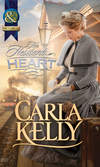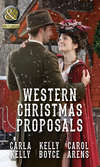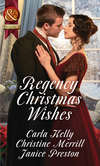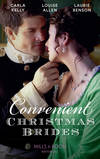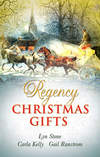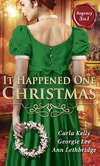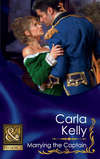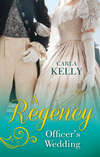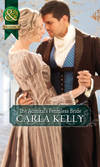Read the book: «Her Hesitant Heart»

Praise for award-winning author Carla Kelly:
‘A powerful and wonderfully perceptive author.’
—New York Times bestselling author Mary Jo Putney
‘It is always a joy to read a Carla Kelly love story.
Always original, always superb, Ms Kelly’s work is a timeless delight for discerning readers.’
—RT Book Reviews
‘Kelly has the rare ability to create realistic yet sympathetic characters that linger in the mind. One of the most respected … Regency writers.’
—Library Journal
‘These two have seen each other at their best and at their worst. Have been tried and tested in the flames yet come out stronger for it.
I certainly enjoyed the trip …’
—Dear Author on MARRYING THE ROYAL MARINE
‘Taking her impetus from Robinson Crusoe and the film Castaway, Kelly crafts the story of a shipwreck survivor readjusting to civilisation … Kelly presents a clear portrait of the mores and prejudices of the era, and demonstrates how to navigate through society’s labyrinth with intelligent, sharp repartee. This alone is worth the price of the book.’ —RT Book Reviews on BEAU CRUSOE
The Major went inside, and there was Susanna Hopkins at the ticket window. He had no doubt it was her: medium height, blonde hair. He couldn’t discern her figure because of her overcoat, but she looked surprisingly tidy, considering her days on the train from Pennsylvania.
Interested, he watched her. The station master pointed to the fare chart. Joe watched as she took another look into her wallet. The station master shrugged his shoulders, then gestured for her to move aside. She sat on the bench by the potbellied stove.
He saw her face when she turned around and it was a sweet face, heart-shaped. Her blonde hair had a dark blaze by her temple. Gold-rimmed spectacles were perched on her nose, but they could not hide the bleakness in her eyes. He knew he was looking at a fearful woman.
Joseph Randolph’s heart went out to the woman who sat, terrified, on a bench in the dirty stage depot. She may be divorced, but what drives a woman to this? he wondered, even as he loosened the muffler about his neck, removed his hat, and started to unbutton his greatcoat. Whatever her marital woes, Mrs Susanna Hopkins looked like she needed good news.
About the Author
CARLA KELLY has been writing award-winning novels for years—stories set in the British Isles, Spain, and army garrisons during the Indian Wars. Her speciality in the Regency genre is writing about ordinary people, not just lords and ladies. Carla has worked as a university professor, a ranger in the National Park Service, and recently as a staff writer and columnist for a small daily newspaper in Valley City, North Dakota. Her husband is director of theatre at Valley City State University. She has five interesting children, a fondness for cowboy songs, and too many box elder beetles in the autumn.
Novels by the same author:
BEAU CRUSOE
CHRISTMAS PROMISE
(part of Regency Christmas Gifts anthology)
MARRYING THE CAPTAIN* THE SURGEON’S LADY* MARRYING THE ROYAL MARINE* MARRIAGE OF MERCY THE ADMIRAL’S PENNILESS BRIDE
*linked by character
Did you know that some of these novels are also available as eBooks? Visit www.millsandboon.co.uk
Her Hesitant
Heart
Carla Kelly
To Captain Andrew and Elizabeth Burt, Ninth Infantry.
Prologue
December 31, 1875
Dearest Tommy,
I am somewhere in Nebraska. I am told by other travelers on the Overland Express that when the sun comes up we will see Chimney Rock, that prominent landmark to settlers and gold seekers years ago.
Be diligent in your studies. It is my fondest wish that you will do well in your schooling and be a blessing to all who know you.
I think of you constantly and would give the earth to see you. I wish you well with all my heart.
Love,
Mama
On a separate sheet she wrote,
Frederick,
If you have commandeered this letter like all the others, rest assured that I will continue to write to Thomas, even when I arrive at Fort Laramie. Should some spark of sympathy enter your heart, send his letters to me, care of Captain Daniel Reese, Company D, Second Cavalry, Fort Laramie, Wyoming Territory.
Please, Frederick!
Susanna
Susanna Hopkins sealed the letter, and tried to make herself comfortable. Her back ached from sitting upright since she had boarded the Pennsylvania Central some days ago. Her coach ticket had been a gift from her uncle. He had not mentioned a Pullman berth and she had been too shy to ask.
Susanna knew her relatives were relieved to send her to a place so distant that it wasn’t even a state yet. She knew her aunt was overjoyed to have her gone from the house in Shippensburg, where she had fled from Carlisle for refuge more than a year ago. Now her aunt could invite her friends into her home again, without the presence of an embarrassing niece.
Susanna waited for the steward to turn out the lamps. Apparently the Union Pacific felt that if its less well-heeled clients could not afford a sleeper car, they should sit in the dark, contemplating the sin of poverty.
The trip had been pleasant enough, except for her hunger. Quick stops at cook shacks along the route were designed for aggressive men who snatched pie and coffee before the train whistle blew. The last stop had found her with only a piece of corn bread. Just as well. She had no idea how much the Cheyenne-Deadwood stage would cost, once she reached Cheyenne, and she needed to save her money.
Susanna regarded her reflection in the glass. Her eyes were only the barest outline, but she removed her spectacles and fingered the bone under her left eye, seeking out the ridge where the occipital bone had almost reconnected, leaving her with a little droop.
“You’re lucky to have an eye, Mrs. Hopkins,” her physician had told her, prescribing a mild correction to the lens. With the lights out, she would be able to rest her eyes. It was treatment the doctor would have ordered, and apparently the Union Pacific agreed.
Susanna turned her attention to the full moon. As her eyes accustomed themselves to the dark, she saw large, dark shapes in the near distance. She touched her cheek. I could have dodged his hand, she told herself for the hundredth time. It was the sight of Tommy, rushing to grab his father’s upraised hand, that had surprised her. Tommy, you should have stayed in bed! The blow had driven her face against the mantelpiece.
She closed her eyes against the memory of her son’s efforts to help her, and then his cries of protest as his father carried him upstairs. It had been her last glimpse of her son. Some instinct had warned her that to remain this time would be to die.
“Pardon me, ma’am.”
“Y-yes?”
“If you have two cents, I’ll take that letter to the mail car,” the porter whispered.
She handed two pennies and her letter to the porter. He came back later with a blanket and pillow.
“I cannot afford those.”
“No one’s using them” was all he said.
She nodded, still surprised at unexpected kindness.
“Ma’am …”
“Yes?”
“Happy New Year.”
Chapter One
Emily Reese, not the brightest lady, had been unable to furnish Major Joseph Randolph, Fort Laramie’s post surgeon, with a working description of Susanna Hopkins, her older cousin. “I think she is thirty-two,” Emily had said. “Old, anyway.”
Joe smiled at that. “I doubt traveling females will be thrilled if I ask if they are thirty-two,” he had told her. “Give me a better description, Emily. She’s your cousin.”
He knew her well enough to call her Emily. Almost five years ago he had delivered her son, Stanley, in an army ambulance between garrisons. Emily Reese had been neither his best patient nor his worst one.
Emily obliged with a better description. “She is of medium height, average figure, and her hair is blond.”
She became serious quickly. “I appreciate this, Major,” she told him. “If you can take her in the ambulance, so much the better. She does not have much money.” She thought a moment, then whispered, “Susanna is divorced.”
“That is not my business,” Joe said.
“You’re a surgeon,” she countered. “Anything I tell you is confidential.”
He sighed, wondering how Emily Reese’s husband managed to keep from drinking himself to death. Some men must prefer stupid wives. Come to think of it, Captain Daniel Reese wasn’t the brightest company commander in the army. “Emily, I’m not a priest. I keep medical matters confidential.”
She couldn’t seem to stop. “She abandoned her son. I can’t imagine that, but she is a relative, and my parents had to help her.”
“I’m certain she had her reasons,” Joe replied. Good God, what kind of relative would blab such a scandal? he asked himself. They sound as horrible as mine. “I hope you won’t reveal this to anyone else,” he said, not sure how much force to apply to a scold. “You know what gossips army people are.”
“Should I make up a story?”
“Say nothing. All anyone wants is a teacher.”
“I know! I will say she is a war widow!”
Joe sighed. “Emily, don’t. Can’t you imagine how distressed the veterans would feel about such a lie? We saw our friends die from Bull Run to Appomattox Court House! Please, please don’t.”
Joe hadn’t minded the diversion of looking for a lady on the train. General court-martial duty in Cheyenne right before Christmas was never pleasant, unless those presiding thought to catch the eastbound Overland Express for home. He probably wouldn’t have been involved in this unshirkable army duty, except that one of the defendants was a major, and there must be majors and above weighing him in the balance.
Joe had no plans. His former home was a plantation west of Richmond and his two widowed sisters residing there had long ago turned his portrait to the wall, and returned his letters, except the one containing a bank draft for taxes on the place. No wonder I am a cynic, Joe told himself on more than one occasion.
Unexpectedly, the court-martial had dragged on much longer than anticipated, and the officer board watched its holiday plans turn to gall and wormwood. The defendants—officers who should have been cashiered years ago—had argued long and eloquently to avoid removal from the army.
The matter had ground on, each officer on the board growing surly as the likelihood of Christmas at home vanished. To no one’s surprise, revenge came as both defendants were cashiered.
Major Walters, a single fellow like himself, was in no hurry to return to dreary Fort Fetterman. The officers’ mess at Fort Russell, near Cheyenne, was better and Joe had time to meet the westbound train in Cheyenne that afternoon.
But there was no Susanna Hopkins. He rode the three miles back to Russell, arriving in time to watch Walters dress in his better uniform for the evening’s New Year’s festivities.
Immune to parties, Joe walked to the post hospital. It wasn’t his hospital, but he knew the surgeon well. Sitting close to the heating stove, they toasted the season and swapped gory stories from the late war until the hospital steward came on duty in the morning.
As a consequence, Joe was late to the depot; the train had already departed. Joe directed the ambulance driver to the Cheyenne-Deadwood Stage depot, a noisome place with sawdust on the floor to absorb tobacco juice and spittle.
The major went inside, and there was Susanna Hopkins at the ticket window. He had no doubt it was her: medium height, blond hair. He couldn’t discern her figure because of her overcoat, but she looked surprisingly tidy, considering her days on the train from Pennsylvania.
Interested, he watched her. The stationmaster pointed to the fare chart. Joe watched as she took another look into her wallet. The stationmaster shrugged his shoulders, then gestured for her to move aside. She sat on the bench by the potbellied stove.
Joe saw her face when she turned around, and it was a sweet face, heart-shaped. Her blond hair had a dark blaze by her temple. Gold-rimmed spectacles perched on her nose, but they could not hide the bleakness in her eyes. He knew he was looking at a fearful woman.
Joseph Randolph’s heart went out to the woman who sat, terrified, on a bench in the dirty stage depot. She may be divorced, but what drives a woman to this? he wondered, even as he loosened the muffler about his neck, removed his hat and started to unbutton his greatcoat. Whatever her marital woes, Mrs. Susanna Hopkins looked like she needed good news.
Susanna felt tears behind her eyelids. She raised her spectacles and pressed her fingers hard against the bridge of her nose to stop the tears. Crying in front of strangers would only lower her further into that class of pitiful women without purpose or goal. I am not there yet, she reminded herself.
She had passed a Western Union office on her short walk from the depot to the stage station. Perhaps she could wire Emily at Fort Laramie and explain her plight. Maybe she could leave her luggage at Western Union. Surely some establishment needed a temporary dishwasher, or even a cook.
If not that, perhaps she could find a church, and pour out her troubles to a minister. Her optimism faded. If she had to tell her whole story to a minister before he would help her, she would fail. Her own minister in Carlisle had counseled her to return to the man who had abused her. When she refused, he had shown her the door without another word.
“Mrs. Susanna Hopkins?”
Startled, she looked up at a tall man in uniform. His greatcoat was unbuttoned, and she saw gold braid and green trim on his collar. She glanced at his face and then looked away, shy, even though her brief glance took in a kind face. “Do … do I know you?” she stammered.
“No, ma’am, you don’t, but I have been sent by Mrs. Emily Reese. She said you were medium height and blonde, and I’ve been looking.”
She took a deep breath. “You’re from Fort Laramie?”
“Yes, ma’am.” He gestured to the bench. “May I sit?”
“Of course, uh, Captain …” She paused, not sure of his rank.
“Major, ma’am, Major Joseph Randolph, with the Army Medical Corps.”
They shook hands. Before she could stop herself, Susanna blurted out, “I’m three dollars short of the fare for the Cheyenne-Deadwood Stage.”
“It happens,” he told her, unperturbed.
He was a big, comfortable-looking man, his hair dark but graying. Fine lines had etched themselves around his eyes and mouth, probably from the sun and wind. Susanna thought his eyes were brown, but she gave him only a glance.
“When Emily heard I was to be in Fort Russell, she thought I could spare you a trip on the Shy-Dead.”
“How kind of you!” She stopped, embarrassed.
She could tell her exclamation startled him. “It’s easy, Mrs. Hopkins, if you don’t mind keeping company with men in an ambulance.”
“An ambulance?” she asked doubtfully. “Someone is ill?”
“We travel that way in the winter, when we can.”
He had a distinct Southern drawl, stringing out his words in a leisurely way, and saying “ah” instead of “I,” and “own” instead of “on.” She hadn’t thought to hear a Southern accent from a man in a blue uniform.
“I was planning to meet the train, but New Year’s interfered,” he said.
She had to smile at that artless declaration. “Too much good cheer?”
He smiled back. “Medicinal spirits! Fort Russell’s post surgeon and I refought Chattanooga and Franklin, and before I knew it, I was late. We’re leaving tomorrow morning, ma’am. There’s room for you.”
“I’m obliged,” she said. “I’ll be ready.” She stood up, as though to dismiss him, unsure of herself.
He stood, too. “I can’t just leave you here until tomorrow morning,” he told her. “I’ll take you to a hotel.”
She shook her head. “I’ll be fine.” She looked around at men sitting on benches, a cowboy collapsed and drunk in the corner, and an old fellow muttering to himself by the water bucket.
“A modest hotel,” he insisted.
She could tell he wasn’t going to leave her there. “Quite modest, Major Randolph,” she replied.
“Cheyenne has only modest hotels,” he informed her. “There is a pathetic restaurant close by, and we’ll stop there, too.”
“That isn’t necess—”
“I’m hungry, Mrs. Hopkins,” he said. “So is my driver. Be my guest?” He peered at her kindly. “Don’t argue.”
“Very well,” she said quietly.
“Excellent,” he said, as he buttoned his greatcoat and put on his hat. “You’ll find it a relief from those cook shacks along the UP route.”
“I never got close enough to the counter,” she said, then stopped, embarrassed.
“In two days?” the major exclaimed. “Mrs. Hopkins, you are probably hungry enough to chew off my left leg.”
She had the good sense to capitulate. “I am famished, but not quite that hungry!”
He picked up both of her bags. “This all your luggage?” he asked.
“I left a portmanteau at the depot.”
“Then we’ll get it.”
He helped her into the boxy-looking wagon with the straight canvas sides. The vehicle was unlike any other she had ever ridden in, with leather seats along each side, and a small heating stove. “This is for wounded people?” she asked, after he got in and seated himself opposite her.
He nodded. “You can take out the seats and stack four litters in here. Wives and children in the garrison generally travel this way.”
The major fell silent then and she was content not to make conversation with someone she barely knew. At the depot, the private retrieved her portmanteau and stowed it beside her other luggage in the rear of the ambulance. She was soon seated in the café with the major, the private having found a table in the adjoining bar.
She ordered soup and crackers. The major overruled her and chose a complete dinner for her. “You’re my guest,” he reminded her, “and my guests eat more than that, Mrs. Hopkins.”
She was too hungry to argue. “Thank you.”
“You’re welcome. How would it look if you starved while in my company? The Medical Corps would rip off my oak leaf clusters and kick me down to hospital steward.”
He left her at the Range Hotel, but not without making sure the clerk put her in a room between two families. “This town’s just a rung up from Dante’s inferno. Never hurts to be careful,” he told her.
She gave him the same startled look that had puzzled him in the stage station, but he understood now—Susanna Hopkins was unused to kindness.
He would gladly have paid for her room, and she must have known that. Before he could say anything to the desk clerk, she took out the money she must have reserved for the stage, and laid it on the counter. She hesitated for a moment.
She kept her voice low. “Major, do I pay something for my transportation?”
“No, ma’am, that’s courtesy of the U.S. Army.”
“How kind,” she said, and returned to the desk clerk. Joe was struck again at her wonder, as though good fortune had not been her friend, or even a nodding acquaintance recently.
He reflected on that all the way back to Fort Russell. He had learned from childhood that women were to be protected and cherished. Hard service in the war had showed him the other side of that coin, when he saw too many thin, tight-lipped women, unfamiliar with kindness. Susanna Hopkins had that same wary look, and he wondered why.
Chapter Two
Susanna waited in the lobby the following morning. Breakfast had been amazingly cheap: a bowl of porridge and coffee for a dime.
The major arrived before the sun rose, wide-awake this time. “You’re a prompt one, Mrs. Hopkins,” he told her.
A glance from the major sent the desk clerk hurrying to carry her luggage to the ambulance. Susanna let the major help her into the vehicle, which was already warm. Bundled in overcoats, two other officers nodded to her.
There was space next to one of the men, but someone had left a book there. The only other seat was a rocking chair—close to the little stove—that had been anchored to the wagon floor and covered with a blanket.
“That’s for you,” the major said.
“But …”
“For you,” he repeated. “Let us come to a right understanding. We take good care of the ladies in the army.”
The other men nodded. “They’re scarce,” said one about Major Randolph’s age.
Susanna seated herself on the rocking chair, grateful for the warmth.
“Let me introduce you, Mrs. Hopkins,” Major Randolph said. “Major Walters, who understands the scarcity of ladies, is from Fort Fetterman.”
The officer tipped his hat to her. The surgeon indicated the other man. “Captain Dunklin is from Fort Laramie. This is Mrs. Hopkins, gentlemen.”
“For God’s sake, close the door,” Captain Dunklin demanded.
Major Randolph closed the door behind him and latched it. He picked up his book and took his seat, and she heard the driver chirrup to the mules.
Susanna pulled the blanket close around her. She glanced at Major Randolph, who was staring at her with a frown. She looked at him, then realized he was staring at the blanket. She stared at it, too, wondering.
“Mrs. Hopkins?”
She looked at Major Walters. “Your blanket is too close to that stove,” he whispered.
She looked. The blanket was not close to the stove, but she pulled it to her anyway. “Better?”
“Perfect.”
She glanced again at Major Randolph, who sat back with a relieved expression on his face. I don’t understand what just happened, she thought. I should say something. “Captain, uh … excuse me ….”
“Dunklin,” he offered, as if relieved to break the charged silence.
“Captain Dunklin, you have children who will be attending school?” She glanced at Major Randolph, who stared straight ahead, as if seeing something no one else saw. In another moment, he settled back with a sigh.
“I have one son, aged nine. High time he went to school.”
She couldn’t hide her surprise. “My cousin wrote that there is a school already.”
“Yes, one run by the private.”
Susanna heard the disdain in his voice.
“The army requires that children of enlisted men must be educated, but officers’ children are merely invited,” Major Randolph explained.
“Not required?”
“No, ma’am,” he said. “Strange to you?”
“A little. Surely an officer’s child could learn something from a private.”
“We try not to mingle,” Dunklin said. “Joe, you’d understand if you had children.”
Susanna could tell from the post surgeon’s expression that he understood no such thing. I should think any school would be better than no school, she thought. Captain Dunklin was already reminding her of Frederick, because he seemed so certain that he was right. “Probably the private does his best,” she said, defending her profession.
“He does,” the surgeon said. “Private Benedict has eleven pupils now, all ages.” He must have noticed her expression of interest. “I head the post administrative council, and one of my responsibilities is the school.”
“Is there a schoolhouse?”
“No. They meet in a room in the commissary storehouse.”
“Between the salt pork and the hardtack,” Dunklin interjected. He laughed, but no one joined him.
From the look the post surgeon exchanged with Major Walters, Susanna suspected Dunklin was not a universal favorite.
The silence felt heavy again, but Dunklin filled it. “Where are you from, Mrs. Hopkins? Your cousin mentioned Pennsylvania.”
“Shippensburg, originally,” she said, afraid again. Major Randolph glanced at her. It was the smallest glance, but some sixth sense, honed to sharpness by years of fear, told her he knew more.
“My wife is from Carlisle!” Dunklin exclaimed. “She won’t waste a moment in making your acquaintance.”
Please, no, Susanna thought in a panic. “I … I didn’t get out much in society,” she stammered.
Dunklin nodded, his expression serious. “Your cousin told us of your loss. Too many ladies are war widows.”
Her heart plummeted into her stomach. She wondered what story her cousin had started, in an attempt to make her more palatable to the people of Fort Laramie. Suddenly the twenty miles between Shippensburg and Carlisle seemed no longer than a block.
“Mrs. Hopkins?” Major Walters asked, concerned.
“I shouldn’t have brought it up,” Dunklin said.
“No, it’s just …” She stopped. Do I explain myself to these men? she thought in desperation. Do I say nothing? She sat there in misery, trapped. “Don’t worry, Captain Dunklin,” she said, becoming an unwilling party to a lie. “I am resigned to my lot.”
Dunklin nodded. He placed a board on his knees, took out a deck of cards and was soon deep in solitaire.
Major Randolph regarded her, and she realized with a shock that he knew she lied. What had Emily done? I must explain to him at the first opportunity, Susanna told herself. Drat Captain Dunklin for having a wife from Carlisle.
They stopped midmorning, which felt like an answer to prayer. For the past hour she had been wondering how she could delicately phrase the suggestion that they stop for personal purposes. And if they did stop, what then? A glance through the canvas flap revealed no shielding trees or even shrubs.
Without a word, the men left the ambulance. A shift of weight told her that the driver had followed them. Major Randolph was the last man out. Without a word, he lifted the seat where Captain Dunklin had been sitting, nodded to her and left. Speechless with embarrassment, she stood up and looked down at a hole and the snowy ground beneath. “That’s clever,” she murmured.
She peeked out the canvas flap to make sure no one stood nearby. There they were, standing off the road, their backs to her. By the time they returned to the ambulance, the seat was down again, and she had returned to her chair.
“We’re stopping tonight at Lodgepole Creek stage station,” Major Randolph informed her as they started again. “I have a little errand of mercy, a small patient.”
They stopped at a roadhouse for luncheon, which turned out to be a bowl of greasy stew and a roll amazing in its magnitude and excellence.
“This joint is famous for the rolls, but you don’t get one unless you suffer the penance of the stew,” Major Randolph joked.
Susanna ate quickly and excused herself, wishing for solitude, even if solitude meant cold. She was scarcely out the door when she heard someone behind her. She turned around, dreading to see the post surgeon, but it was Major Walters.
“It’s too warm in there,” she said.
The major extended his arm, so she had no choice but to tuck her arm in his. “Let’s walk.”
She let him lead her away from the roadhouse toward a line of trees, stopping by a frozen stream.
“Does it ever warm up?” she asked.
“With a vengeance,” he assured her. “One day it’s like this, then everything starts to drip and thaw.”
They stared down at the stream, where Susanna thought she could see the shadows of fish. She pointed to them. Major Walters nodded. “Everything’s just waiting for better days.”
So am I, she thought.
Major Walters seemed in no hurry to turn back. Hesitant, she said, “Major, I have to ask …. Why did Major Randolph seem so intent on that blanket and the stove? It wasn’t close.”
“No, but that doesn’t matter to Joe,” the major said, starting back now. “As you might have noticed from his accent, Joe is from Virginia.”
She nodded.
“He was part of the Medical Corps before the war, and stayed in when others went to the Confederacy. Good surgeon, from all accounts.” Walters sighed. “A pity he couldn’t save the one person he loved.”
The major stopped, even though the other officers had left the roadhouse and were looking in their direction.
“He met Melissa Rhoades in Washington—her father was a congressman from Ohio—and they married after the war. He continued in federal service.” They started walking again. “On the regiment’s march to Fort McKavett in Texas, Melissa’s skirt brushed too close to a cooking fire.”
“God,” Susanna whispered.
Major Walters lowered his voice. “She suffered agonies for nearly a day, and there wasn’t a thing he could do to help her.” The major gave her a wry smile. “That’s why he gets concerned when any woman is close to a fire.”
Susanna nodded. “He hasn’t remarried?”
“No. Perhaps ten years hasn’t been enough to erase that sight from his mind.” Walters shook his head. “I shouldn’t dredge up sad memories of the war for you, Mrs. Hopkins. My apologies.”
Aghast that her cousin’s lie was sinking her deeper into falsehood, Susanna held her breath, then let it out slowly. To her shame and confusion, her kind escort took her silence as agreement.
Major Randolph stood by the ambulance, looking at her with a frown. He knows I am a liar, she thought miserably. She looked at the roadhouse, and back down the snowy track that led to Cheyenne. There was nowhere to run.
Joe stared at his book for much of the afternoon as the ambulance trundled forward, reading and then rereading each page until it made no sense. What he really wanted to do was reassure Mrs. Hopkins.
He hadn’t mistaken the fright in her pretty eyes. She seemed to sense that he knew more than the others. He had to assure her that her secret was safe with him.
He watched the clouds over the bluffs, threatening snow but going nowhere, much like his own life. He dutifully returned to his book, but his mind was on Susanna Hopkins.
She was pretty—maybe some seven or eight years younger than he was. What intrigued him the most were her eyes, large and brown behind her spectacles. He wanted to look closer out of professional interest, because one eye appeared slightly sunken, as though the occipital bone was damaged.
The free excerpt has ended.

